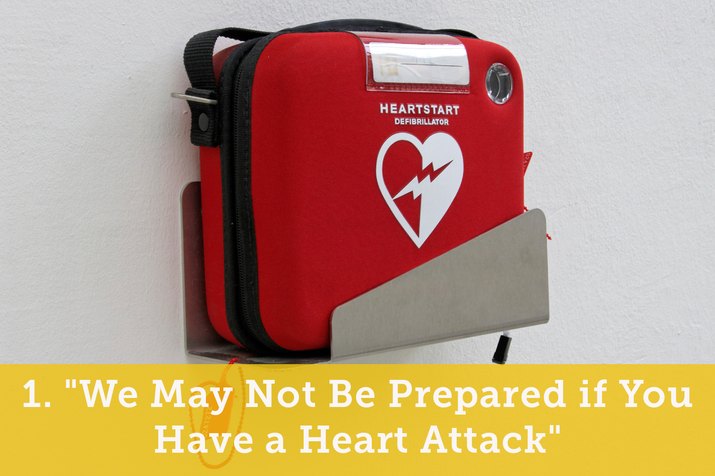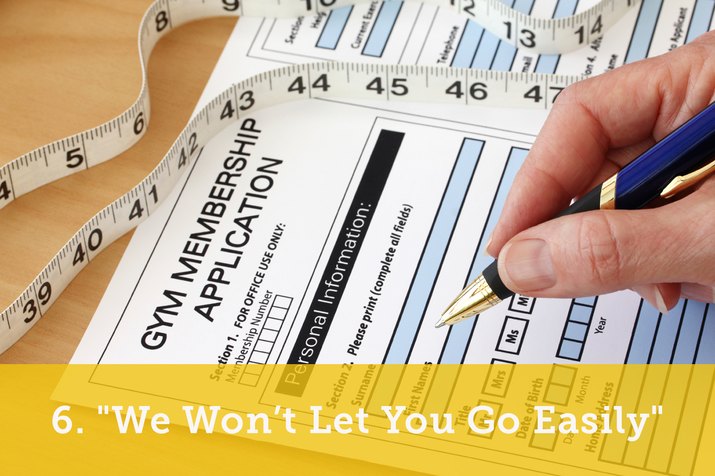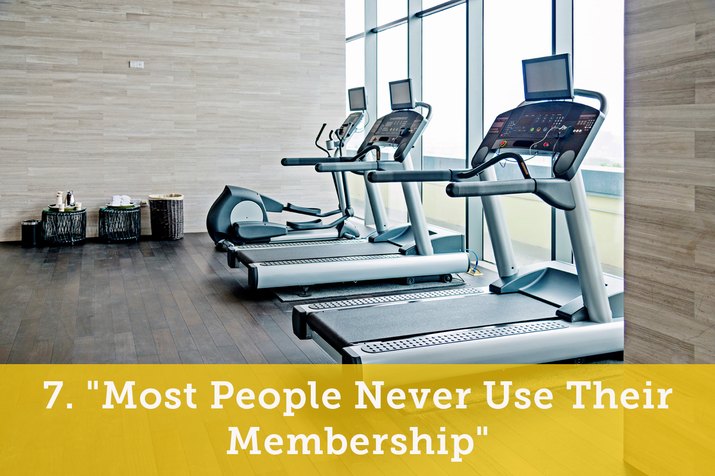
Overview
If you're thinking about joining a gym — or maybe you just joined one — you're on the right track! But while you may dream of building strong abs, your gym has a financial bottom line to meet. After all, they're first and foremost a for-profit business.
In fact, total revenue for the fitness industry topped $30 billion in 2017, according to the International Health, Racquet, and Sportsclub Association. In short, fitness is big business. Read on to find out 10 things most gyms won't disclose to you but are essential to know before signing up for a membership.

1. "We May Not Be Prepared If You Have a Heart Attack"
Trained, non-medical personnel can use devices like automated external defibrillators (AE) to help a person having a heart attack. Problem is, not all gyms are required to have AEDs. Only Arkansas, California, Illinois, Indiana, Iowa, Louisiana, Maryland, Massachusetts, Michigan, Mississippi, New Jersey, New York, Oregon, Pennsylvania, Rhode Island and the District of Columbia legally require them, according to the National Conference of State Legislatures.
Even if the gym supplies an AED, the staff might not be trained to use it. Ask the management at your gym (or a gym you're considering joining) whether they're prepared for such an emergency and whether the staff is trained to assist.

2. "We’re Not Responsible for Items Stolen Out of Your Locker"
Most gyms post signs in locker rooms absolving themselves of any responsibility if your laptop or other valuables go missing. "Some [people] are professional thieves who go into gyms using a one-day pass, specifically to break into lockers when no one's around," says Tom Holland, fitness expert and former owner of a Connecticut gym.
Consider leaving your valuables at home (or locked in the trunk of your car). If you must bring them to the gym, carry your valuables with you and/or choose lockers in busy areas, not in secluded corners of the locker room where thieves can go undetected.
Read more: 10 Gym Etiquette Rules Trainers Wish You'd Stop Breaking

3. "Some of Our Trainers Aren’t Certified"
As an unregulated industry, personal trainers don't require a license to practice. So before you sign up for your gym's personal training, ask whether their trainers are certified. "Some gyms have their own certifications, which are bogus," says Holland. "When you sign a waiver, you sign away your rights if you get hurt."
Look for nationally recognized certifications from organizations such as the American Council on Exercise (ACE), American College of Sports Medicine (ACSM) and the National Strength and Conditioning Association (NSCA). And be sure to also ask about the trainers' years of experience.
Read more: 9 Questions Your Trainer Wishes You'd Ask

4. "The Gym Is Crawling With Germs"
Sweat, exposed skin and a lot of people in a small area create a veritable paradise for pathogens to thrive in. "Most gyms are not really clean, and many do not take adequate measures to clean," says Drew O'Connell, Los Angeles-based master trainer and founder of Now Body Fitness.
Always use a towel on weight benches, avoid touching your face and wash your hands immediately after your workout. And as a favor to your fellow gym-goers, please stay home when you're sick.
Read more: 8 Nasty Skin Infections You Can Catch at the Gym (and How to Avoid Them)

5. "We’ll Tell You Anything to Get You to Join"
According to many gym sales pitches, you'll lose weight, change your body and improve your overall quality of life if you join their gym. "They'll tell you exactly what you want to hear to get you to sign up," says T.J. Berry, a Utah-based personal trainer.
"These can prove to be true if you utilize the facility to its maximum potential. But most people don't. All gyms are businesses set to make money, so be careful when their sales team coerces you." Also be sure to check out the gym during the hours you'll most often be using it to see how crowded it gets.

6. "We Won’t Let You Go Easily"
Cancelling a gym membership can be surprisingly challenging, especially with cancellation fees or timelines. So read the fine print before you sign on the dotted line. Paying month-to-month ties you to the gym through your credit card — and good luck getting them to stop billing you.
Holland recommends ditching the monthly fee altogether by paying up front if you can afford it (and if you're committed to using the gym). "They may even tempt you by offering you a discount. Regardless, never sign right away," says Holland, who recommends taking the contract home with you and reading it thoroughly so you understand their cancellation policies.
Read more: 7 Signs It's Time to Break Up With Your Gym

7. "Most People Never Use Their Membership"
Once you sign up, gym owners actually count on you not to show up. Most people pay for a membership, and then drop out within a few months. "If 20 percent of members show up, it's a payoff," says Holland.
Considering the average cost of a monthly gym membership is generally around $55 and millions of Americans belong to health clubs, it's easy to see how gyms benefit when members pay and don't show up. Make sure you're committed to using the facility before wasting your money.

8. "We Can Waive the Initiation Fee"
In addition to a monthly fee, gyms typically charge an initiation fee. This can run into the hundreds of dollars. You should never pay the initiation fee, says fitness trainer Holland. "It's just to make money, and you can usually have it waived; it's often a kickback to the trainer or sales rep."
Gyms may be more likely to make a deal with you at the beginning of the year with New Year's promotions and specials. In addition, ask about other discounts. The majority of health clubs offer discounts to families and couples.

9. "You Can Get Hurt"
It's easy to get caught up in the excitement of a new venture and want to jump in to the most challenging, toughest fitness class right off the bat. But doing so could land you injured and unable to workout.
"Just because a class is popular, doesn't necessarily mean it's good for you," says Holland. Faulty equipment and failure of the gym to maintain equipment can also create grounds for injuries. Report damaged or faulty equipment to management.
Read more: 10 Common Workout Injuries and How to Avoid Them

10. "Orientation Is a Ploy to Get You to Sign Up With Our Trainers"
Many gyms offer a free orientation session or two with one of their trainers when you sign up. The trainer typically takes you through a complex routine and doesn't write anything down with hopes you'll sign up for sessions, says Holland. "They don't write anything down so you'll feel you need them."
It may be worth paying for a few sessions with a qualified trainer if you're a newbie, but be sure to take notes on your own.
Video of the Day
Video of the Day